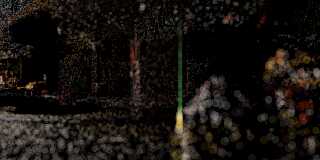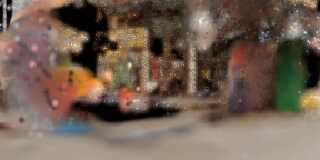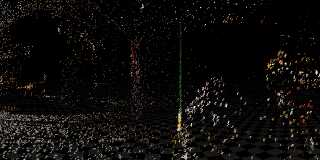 |
 |
|
 |
|
 |
|  |
|  |
|
 |
|
 |
|  |
|  |
|
 |
Never mind that last one.
I flattened the spheres and then rotated them so that they were perpendicular to
the camera.
Try this and see if this gets you anywhere better.
#macro Reorient_Trans(Axis1, Axis2)
#local vX1 = vnormalize(Axis1);
#local vX2 = vnormalize(Axis2);
#local Y = vcross(vX1, vX2);
#if(vlength(Y) > 0)
#local vY = vnormalize(Y);
#local vZ1 = vnormalize(vcross(vX1, vY));
#local vZ2 = vnormalize(vcross(vX2, vY));
transform {
matrix < vX1.x, vY.x,vZ1.x, vX1.y,vY.y,vZ1.y, vX1.z,vY.z, vZ1.z, 0,0,0
>
matrix < vX2.x,vX2.y,vX2.z, vY.x,vY.y, vY.z, vZ2.x,vZ2.y,vZ2.z, 0,0,0
>
}
#else
#if (vlength(vX1-vX2)=0)
transform {}
#else
#local vZ = VPerp_To_Vector(vX2);
transform { Axis_Rotate_Trans(vZ,180) }
#end
#end
#end
#macro DoPoint(theposition,thecolour)
#local theradius = 0.2;
sphere{<0,0,0>, 0.2 //, 0.05
//disc{<0,0,0>, VP-theposition, 1
texture {
pigment {
onion
colour_map {
[0.00, rgb thecolour transmit 0]
[0.20, rgb thecolour transmit 0.95]
[1.00, rgb thecolour transmit 1]
}
}
finish { emission 1 diffuse 0 specular 0 }
}
scale <0.01, 1, 1>
Reorient_Trans(x, vnormalize(VP-theposition))
scale theradius
translate theposition
}
#end
Post a reply to this message
Attachments:
Download 'scene.png' (678 KB)
Preview of image 'scene.png'

|
 |
|  |
|  |
|
 |
|
 |
|  |
|  |
|
 |
Even if I abandon solids and just create a polygon at each position, Povray
crashes as soon as I scale the polygon up past a certain amount. Is there
possibly an issue if too many objects overlap?
Post a reply to this message
|
 |
|  |
|  |
|
 |
|
 |
|  |
|  |
|
 |
"Paul Bourke" <pau### [at] gmail com> wrote:
> Even if I abandon solids and just create a polygon at each position, Povray
> crashes as soon as I scale the polygon up past a certain amount. Is there
> possibly an issue if too many objects overlap?
I personally am not having that issue.
I have #local theradius = 1;
and it's still just chugging along fine.
It's just a cheap HP EliteDesk i5 with 16GB RAM
Of course, I'm using an edited version of the original...
Maybe it's the Apple version?
Post your current scene and I'll run it unedited.
-BW com> wrote:
> Even if I abandon solids and just create a polygon at each position, Povray
> crashes as soon as I scale the polygon up past a certain amount. Is there
> possibly an issue if too many objects overlap?
I personally am not having that issue.
I have #local theradius = 1;
and it's still just chugging along fine.
It's just a cheap HP EliteDesk i5 with 16GB RAM
Of course, I'm using an edited version of the original...
Maybe it's the Apple version?
Post your current scene and I'll run it unedited.
-BW
Post a reply to this message
|
 |
|  |
|  |
|
 |
|
 |
|  |
|  |
|
 |
On 16/03/2025 01:37, Paul Bourke wrote:
> .... and you increased theradius to 0.1?
>
This is what I got with theradius = 0.1 and no crash.
--
YB
Post a reply to this message
Attachments:
Download 'scene0000.png' (2021 KB)
Preview of image 'scene0000.png'

|
 |
|  |
|  |
|
 |
From: William F Pokorny
Subject: Re: Crashing for reasons I can't fathom
Date: 16 Mar 2025 03:21:48
Message: <67d67c0c@news.povray.org>
|
|
 |
|  |
|  |
|
 |
On 3/15/25 19:12, Paul Bourke wrote:
> There are also nasty defects in the 3.8 render (discs), see attached example
> frame. Strange they are mostly on the right half, it's those narrow dark
> slivers. Perhaps they are a cue to what's happening.
Got up to go to the bathroom(*) and, wow, a lot of posts in this thread.
One of the things I wanted to mention - and didn't as I rushed off to an
appointment yesterday - is that recent versions of POV-Ray do not
increment the trace depth on just transparency. This was a significant
change made to less often get black pixels on hitting the
max_trace_level limit. In other words, it means for your successful
renders, the end of frame output should have text which always reads:
Max Level: 1/6
The only thing stopping the actual internal recursion depth as you move
through multiple discs is the adc_bailout value. This sometimes causes
trouble because depending on any particular ray's path the recursion
depth due the number of surfaces traversed can get very deep. A trick
Alain taught me is that we can restore the old behavior by adding an
interior with an ior of say 1.00001.
Unfortunately, trying this trick didn't fix my v3.7 render even when I
reduced the radius to 0.24 (though at that radius the first blocks now
do render for a while before crashing).
With lidar data, it should be the case that where the radius is small
you traverse through very few - maybe always one - disc. As the radius
increases rays will need to traverse more and more surfaces and the
recursion depth will increase.
One thing which does work for my v3.7 render is changing the color_map
so everything is opaque. Offers a much clearer view of what is happening
with the discs too.
I next tried setting the maximum color_map transparency to 90% and now
my v3.7 renders are rendering fine. As does setting last color_map
transparency to 99%. Image attached (no AA).
So the issue has to do with overlapping regions of complete transparency
I guess. Wonder, does the ior 1+epsilon trick not work in v3.7? Hmm,
maybe with the spherical camera more rays hit the surface parallel to
surface normal? Don't know.
Lastly, you could play with higher adc_bailout values too as a solution
to the v3.7 rendering.
---
On your particular question about artifacts. The discs at larger radius
values will start to cross each other. Where they do there will be a
seam of numerical instability somewhat like coincident surfaces. Some
likelihood this is the cause of the artefacts, but unsure how to be sure
at moment. Can you filter out some range of discs closer to the camera
location?
Bill P.
(*) TMI.
Post a reply to this message
Attachments:
Download 'scene_v3.7_opaque0_990400.png' (194 KB)
Preview of image 'scene_v3.7_opaque0_990400.png'

|
 |
|  |
|  |
|
 |
|
 |
|  |
|  |
|
 |
William F Pokorny <ano### [at] anonymous org> wrote:
> Got up to go to the bathroom(*) and, wow, a lot of posts in this thread.
> Lastly, you could play with higher adc_bailout values too as a solution
> to the v3.7 rendering.
I thought this was just straight rendering - no radiosity.
Also, I replaced all of the ambient statements with emission.
> On your particular question about artifacts. The discs at larger radius
> values will start to cross each other. Where they do there will be a
> seam of numerical instability somewhat like coincident surfaces. Some
> likelihood this is the cause of the artefacts, but unsure how to be sure
> at moment. Can you filter out some range of discs closer to the camera
> location?
I would think the lines would be curved in that instance?
Just out of curiosity, I was wondering what the actual overall scene looked
like, so once I wrapped my head around the coordinate system and
camera-to-look_at orientation, I was able to pull the camera back and look down
over the entire undistorted market.
(see attached)
There are places where there are significant holes / spaces.
I'm wondering if perhaps part of the problem may be that the lines are places
where the rays are making it through to the black background.
Perhaps a non-zero (1/255) sky_sphere or background may help, or something like
a fog effect where the foreground is crystal clear, but the far-away spaces get
filled in with a lighter color. Maybe some sort of large box with a gradient
that's the 4th root of the normalized total distance... that sort of thing.
Due to the time difference, I'm _just_ getting up and having First Coffee - so,
you're getting what you're paying for. ;)
- BW
A huge point set like this is a real treat to play with, since it is large,
asymmetric, offers human-recognizable structure, and has color data built in.
I've been wanting to do a 3D convex hull algorithm, and this would be a great
final test for that.
Wondering what would happen if instead of discs or cylinders or spheres, _cones_
were used instead, oriented looking straight at the smaller face and the larger
end being just large enough to protrude: maybe that might fix the dark artifact
lines if it's a see-through effect. org> wrote:
> Got up to go to the bathroom(*) and, wow, a lot of posts in this thread.
> Lastly, you could play with higher adc_bailout values too as a solution
> to the v3.7 rendering.
I thought this was just straight rendering - no radiosity.
Also, I replaced all of the ambient statements with emission.
> On your particular question about artifacts. The discs at larger radius
> values will start to cross each other. Where they do there will be a
> seam of numerical instability somewhat like coincident surfaces. Some
> likelihood this is the cause of the artefacts, but unsure how to be sure
> at moment. Can you filter out some range of discs closer to the camera
> location?
I would think the lines would be curved in that instance?
Just out of curiosity, I was wondering what the actual overall scene looked
like, so once I wrapped my head around the coordinate system and
camera-to-look_at orientation, I was able to pull the camera back and look down
over the entire undistorted market.
(see attached)
There are places where there are significant holes / spaces.
I'm wondering if perhaps part of the problem may be that the lines are places
where the rays are making it through to the black background.
Perhaps a non-zero (1/255) sky_sphere or background may help, or something like
a fog effect where the foreground is crystal clear, but the far-away spaces get
filled in with a lighter color. Maybe some sort of large box with a gradient
that's the 4th root of the normalized total distance... that sort of thing.
Due to the time difference, I'm _just_ getting up and having First Coffee - so,
you're getting what you're paying for. ;)
- BW
A huge point set like this is a real treat to play with, since it is large,
asymmetric, offers human-recognizable structure, and has color data built in.
I've been wanting to do a 3D convex hull algorithm, and this would be a great
final test for that.
Wondering what would happen if instead of discs or cylinders or spheres, _cones_
were used instead, oriented looking straight at the smaller face and the larger
end being just large enough to protrude: maybe that might fix the dark artifact
lines if it's a see-through effect.
Post a reply to this message
Attachments:
Download 'scene.png' (756 KB)
Preview of image 'scene.png'

|
 |
|  |
|  |
|
 |
|
 |
|  |
|  |
|
 |
On 3/16/25 03:21, William F Pokorny wrote:
> So the issue has to do with overlapping regions of complete transparency
> I guess. Wonder, does the ior 1+epsilon trick not work in v3.7? Hmm,
> maybe with the spherical camera more rays hit the surface parallel to
> surface normal? Don't know.
It just came to me what is likely going on.
The disc has an infinite inside so the 'interior ior' only kicks in on
the fist disc intersection. All the disc surfaces seen after that first
are inside other discs and also have the same ior - so there is no
further refraction, but rather we get again transmitted rays. In other
words, the trick doesn't limit the recursive depth on ray surface
traversals in this case because it only bumps the max trace level by
one. We get Max Level: 2/6 rather than 1/6 - and we were after 6/6.
Bill P.
Post a reply to this message
|
 |
|  |
|  |
|
 |
|
 |
|  |
|  |
|
 |
On 3/16/25 08:36, Bald Eagle wrote:
> I would think the lines would be curved in that instance?
I guess what I was thinking is that off to the left and right the disc
intersections would become perpendicular where one of the two discs has
passed behind the forward directional plane - and both discs are
somewhat near the camera location. But, I admit I'm not sure I've
imagined the situation correctly.
>
> Just out of curiosity, I was wondering what the actual overall scene looked
> like, so once I wrapped my head around the coordinate system and
> camera-to-look_at orientation, I was able to pull the camera back and look down
> over the entire undistorted market.
> (see attached)
Cool. :-)
Bill P.
Post a reply to this message
|
 |
|  |
|  |
|
 |
|
 |
|  |
|  |
|
 |
On 16/03/2025 04:27, yesbird wrote:
> This is what I got with theradius = 0.1 and no crash.
> --
> YB
The charm of these mystical cyberpunk-like images forced me to start
rendering complete animation and this is the first 11 seconds
(334 frames of 3204x512 resolution) with cylindrical projection and
forward-backward loop:
https://povlab.yesbird.online/pb/
Rendering in progress ...
--YB
Post a reply to this message
|
 |
|  |
|  |
|
 |
|
 |
|  |
|  |
|
 |
yesbird <sya### [at] gmail com> wrote:
> rendering complete animation and this is the first 11 seconds
> forward-backward loop:
> https://povlab.yesbird.online/pb/
>
> --YB
Super nice job, Sergey. :)
This is pretty much what I envisioned Paul was shooting for when I saw that all
of the points were a sort of firefly glow.
I just did a quick render using "puffs" that I used in place of spheres.
It adds a peaceful, ethereal, Christmassy feel.
So now I'm thinking that if there was a way to use a collection of actual
snowflake shapes and have them appear, fall a sort way, then fade out - in a
cycle centered on their locations, that might make a cool "animated animation".
Or it might look like a total nightmare of a mess ;)
- BW com> wrote:
> rendering complete animation and this is the first 11 seconds
> forward-backward loop:
> https://povlab.yesbird.online/pb/
>
> --YB
Super nice job, Sergey. :)
This is pretty much what I envisioned Paul was shooting for when I saw that all
of the points were a sort of firefly glow.
I just did a quick render using "puffs" that I used in place of spheres.
It adds a peaceful, ethereal, Christmassy feel.
So now I'm thinking that if there was a way to use a collection of actual
snowflake shapes and have them appear, fall a sort way, then fade out - in a
cycle centered on their locations, that might make a cool "animated animation".
Or it might look like a total nightmare of a mess ;)
- BW
Post a reply to this message
Attachments:
Download 'scenewithpuffs.png' (625 KB)
Preview of image 'scenewithpuffs.png'

|
 |
|  |
|  |
|
 |
|
 |
|  |
|
 |




![]()